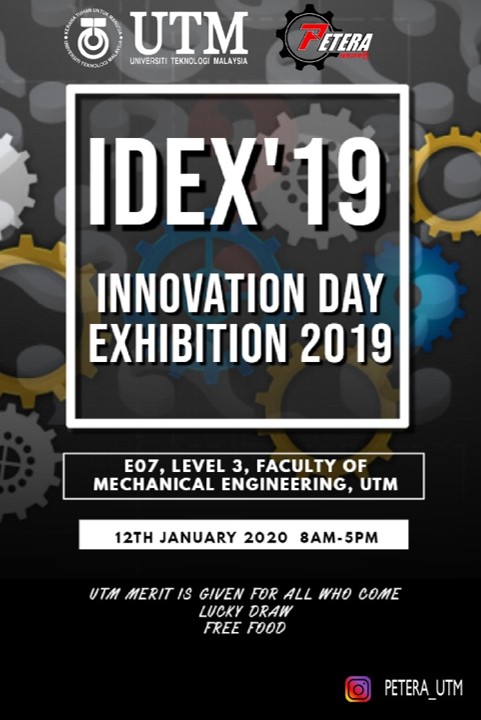
Synopsis
This course is designed for students to gain detailed topical exposure to design methodologies and principles specific to the practice of mechanical design. Emphasis is on developing efficient and effective design techniques as well as project-oriented skills from both technical and non-technical consideration. At the end of this course, students should be able to identify and apply appropriate methodology in performing design tasks, recognize the fundamental principles of mechanical design and practices, and formulate and apply general problem-solving strategy in the analysis of situation, problem and potential problem. At the end of this course, students should be able to identify and apply industry standards in design communication.
Course Learning Outcome (CLO)
- Develop product design specification (PDS) based on research background.
- Construct multiple solutions based on design problem.
- Analyse possible solutions using matrix selection method.
- Develop the final design using the engineering design tools.
- Generate the detail documentation of the final design.
- Construct physical model based on the final design functional aspect.
- Conduct oral and written presentation on final design.
Teaching and Learning Activities
- Project-based learning.
- Students will work in a group of four or five.
- The class is 100% project.
- Team Teaching Project requires experts from other disciplines
Schedule
|
Week 1 |
Overview, Course Information & Overview of System Design Studio: Mini Project Assignment & Discussion |
|
Week 2 |
Phase 1: Problem Identification Product Design Specification (PDS) Team Forming & Team Working Project Planning & Management Studio: Crit. Session |
|
Week 3 |
Phase 1: Problem Identification Product Design Specification (PDS) Team Forming & Team Working Project Planning & Management Studio: Crit. Session |
|
Week 4 |
Phase 2: Concepts Studies, Exploration & Generation Creativity & Innovation in Design Conceptual Development Activity *Team Teaching Studio: Design Concept Proposal |
|
Week 5 |
Phase 2: Concepts Studies, Exploration & Generation Creativity & Innovation in Design Conceptual Development Activity *Team Teaching Studio: Design Concept Proposal |
|
Week 6 |
Phase 3: Concept Evaluation & Selection Final Design Concept Studio: Final Design Concept |
|
Week 7 |
Phase 4: Initial Design Embodiment Material Selection, Bill of Material |
|
Week 8 |
Mid Semester Break |
|
Week 9 |
Phase 4:Application of engineering tool and analysis i.e;Design EfficiencyDFMA – Functional analysisFailure Mode and Effect Analysis*Team Teaching |
|
Week 10 |
Phase 4:Application of engineering tool and analysis i.e;Design EfficiencyDFMA – Functional analysisFailure Mode and Effect Analysis*Team Teaching |
|
Week 11 |
Phase 5: Communication in Engineering Design: Presentation Techniques Presentation Media Report Writing |
|
Week 12 |
Phase 5: Virtual Prototyping Fabrication of Proof of Concept Model |
|
Week 13 |
Phase 5: Virtual Prototyping Fabrication of Proof of Concept Model |
|
Week 14 |
Phase 5: Virtual Prototyping Fabrication of Proof of Concept Model |
|
Week 15 |
Phase 5: Virtual Prototyping Fabrication of Proof of Concept Model |
References
- Dieter, G E and LC Schmidt, Engineering Design, 5th edition, McGraw Hill, 2012.
- Cross, N, Engineering Design Methods: Strategies for Product Design, 4th Edition, John Wiley & Sons, 2008.
- Pugh, S, Total Design: Integrated Methods for Successful Product Engineering, Addison-Wesley, Pub. Co, 1993.
- Karl T. Ulrich and Steven D. Eppinger, Product Design and Development, 5th Edition, McGraw Hill, 2011.
- David G. Ullman, The Mechanical Design Process, McGraw Hill, 2010
Grading
|
Continuous Assessment |
Percentage |
|
|
1 |
Research Background & Problem Statement |
5 |
|
2 |
Product Review & PDS |
8 |
|
3 |
Project Management |
2 |
|
4 |
Concept Development |
15 |
|
5 |
Concept Selection |
5 |
|
6 |
Design Embodiment |
3 |
|
7 |
Application of Engineering Design Tools |
25 |
|
8 |
Construct and Test Working Model |
15 |
|
9 |
Engineering Drawing |
5 |
|
10 |
Oral and Written Communication |
10 |
|
11 |
Entrepreneurship: Costing |
2 |
|
12 |
Team Working |
3 |
|
13 |
Sustainability |
2 |
Attendance
- Student must attend not less than 80% of lecture hours as required for the subject.
- The student will be prohibited from attending any lecture and assessment activities upon failure to comply the above requirement. Zero mark will be given to the subject.
Academic Honesty and Plagiarism
Assignments are individual tasks and NOT group activities (UNLESS EXPLICITLY INDICATED AS GROUP ACTIVITIES)
Copying of work (texts, simulation results etc.) from other students/groups or from other sources is not allowed. Brief quotations are allowed and then only if indicated as such. Existing texts should be reformulated with your own words used to explain what you have read. It is not acceptable to retype existing texts and just acknowledge the source as a reference. Be warned: students who submit copied work will obtain a mark of zero for the assignment and disciplinary steps may be taken by the Faculty. It is also unacceptable to do somebody else’s work, to lend your work to them or to make your work available to them to copy.
Notes
Chapter 001 Design Process & Case Study : Straw Tower
Chapter 002 Intro to Design Process
Chapter 003 Literature Search and Information Gathering
Chapter 004 Product Design Specifications (PDS)
Chapter 005 Source of an idea
Chapter 006 Concept Generation
Chapter 007 Concept Selection
Chapter 008 Report Writing – Part 1
Chapter 009 Product Generation
Chapter 010 Design Tools & Techniques
Chapter 011 Design for Manufacturing and Assembly (DFMA)
Chapter 012 Failure Mode Effect & Analysis (FMEA)
Chapter 013 System Design Report Writing
